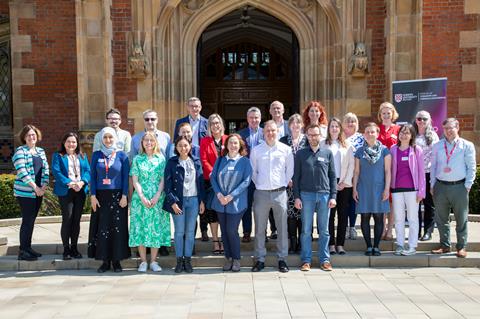The All-Ireland Network for Gender Equality is helping chemistry departments create better working environments
‘One of our colleagues described the email as a godsend,’ says Paul Kavanagh, chair of The All-Ireland Network for Gender Equality in Chemistry about an early offer to help chemistry departments with their Athena Swan applications. The network has now reached its second-year anniversary and has demonstrated that small actions can have big impacts on individuals.
The seed was planted when Kavanagh and his colleagues were tasked with handling the Athena Swan application for Queen’s University Belfast (QUB). Institutions and departments can use the Athena Swan charter to improve gender representation, progression and working environments for all staff, and can submit evidence for a bronze, silver or gold award depending on the extent to which they’ve achieved these goals.
The application took a year to complete. ‘It was the first time we realised the heavy admin burden that was there,’ says Kavanagh. This sparked an idea to use this experience to reduce the burden of other higher education institutions with their applications.
Opening the conversation
‘We really had this idea that a lot of the challenges that we’re facing within chemistry are going to align with other chemistry departments,’ adds Amber Glanfield, co-founder of the network at QUB. The two of them approached the Royal Society of Chemistry (RSC) for funding to hold a workshop to share ideas for how best to support gender equality in the chemical sciences and started reaching out to chemistry departments across the island of Ireland.
The workshop in May 2023 led to the formal establishment of the network and had representatives from every university across Ireland except for Ulster. ‘It was very much a networking event in its core,’ says Glanfield, who wanted everyone to contribute to the vision and direction of the network.

The workshop revealed a lot of common issues among all the universities – especially the leaky pipeline. ‘The transition from PhD to postdoc to academia was a really core issue,’ says Kavanagh, who’s seen that a lot of female colleagues do not progress in their careers after completing a postdoc. Managing caring responsibilities alongside work is a particularly big concern.
Small things make a big difference
One active member of the network, Larisa Florea, an associate professor at Trinity College Dublin, had been trying to achieve something similar for some time. ‘The role of the network is basically to spread the best practices [for gender equality]… and how can we apply those to our department,’ she says. Florea experienced some positive strategies when she returned to work after maternity leave – including ‘not having to teach the first semester so that you can get back into your research and have that additional time to get things back to normal’ – and shared these with the network so others can bring up the idea to the policymakers at their universities.
‘We are also sharing opportunities for funding with the network,’ says Florea. She also emphasises the role of formal, systemic peer support: ‘[it] is enormously beneficial. It can really make for a very successful career.’
It helps everybody
The network also helps individuals, offering a listening ear to those who face barriers in their careers. It helped one technician gain RSC membership through university funding and assisted with the application form so she could apply for online courses. ‘That support has led to promotion for her,’ says Glanfield, adding that losing talent through lack of promotion is an issue that the network has identified.
Athena Swan is usually seen through a women’s lens, but Kavanagh asserts that these initiatives benefit everyone. ‘I have benefited a lot from flexible working, parental policies on carers … it helps everybody,’ says Kavanagh.
‘We try to have a 50:50 gender balance,’ says Glanfield. Kavanagh acknowledges that gender work is usually bestowed onto female academics, which is one reason why the network’s meetings are biannual. ‘We have a high number of female participants, and we don’t want to overburden [them] with more meetings,’ he explains.
An intersectional future
‘One of the things we want to really use the network for is to be an advocacy group that can try and influence policy makers, particularly funding agencies,’ says Kavanagh. The network would like a funding structure to be adopted that is more accommodating to female researchers, as well as for departments to provide ample teaching and mentorship opportunities to make employment more supportive and flexible.
The network is also adopting intersectional approaches. Glanfield wants to look at other characteristics that create barriers for a career in chemistry, highlighting socioeconomic background as an important consideration in Ireland. Similarly, Florea is working on a paid programme called Rise to encourage participation from ethnic minority backgrounds.
The network will hold its third meeting on 29 May in conjunction with the Rise programme. Attendees will discuss more opportunities for advocacy, how to strengthen partnerships between academia and industry and consolidate their commitment to sharing best practice. The goal is for all chemistry departments in Ireland to achieve a gold Athena Swan award. ‘We want positive outcomes for everyone,’ says Glanfield.
The network held its third meeting on 29 May in conjunction with the RISE programme, where attendees discussed more opportunities for advocacy, how to strengthen partnerships between academia and industry and consolidate their commitment to sharing best practice. The goal is for all chemistry departments in Ireland to achieve a gold Athena Swan award. ‘We want positive outcomes for everyone,’ says Glanfield.

















No comments yet